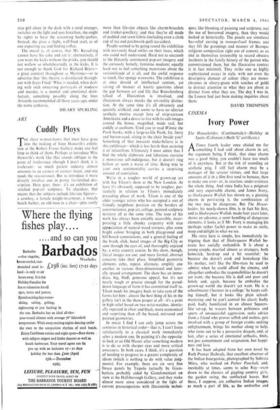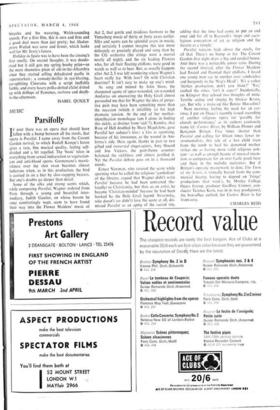CINEMA
Ivory Power
A Times fourth leader once chided me for ..something I had said about charm in art, the argument being, I think, that since charm was a good thing, you couldn't have too much of it anywhere. But at the risk of sounding an aesthetic prig, I still feel charm may be a damager of the severer virtues, and that large amounts of it in a film first tend to bemuse, then to make one over- or, in reaction, under-estimate the whole thing. And since India has a poignant and very exportable charm, and James Ivory, as Shakespeare Wallah has shown us, a piercing charm in portraying it, the combination of the, two may be dangerous. But The House- holder, his newly-shown film, is in fact his first, and as Shakespeare Wallah, made four years later, shows an advance, a surer handling of dangerous elements, it looks as if Mr. Ivory is managing his (perhaps rather facile) power to make us smile, weep and delight in what we see.
His story here is simple, less immediately in- triguing than that of Shakespeare Wallah be- cause less socially outlandish. It is about a young couple, married almost as strangers, both homesick, hard-up and a bit resentful : he because she doesn't cook and housekeep like his mother, isn't like the film-stars he used to admire when he could afford the cinema, and altogether embodies the responsibilities he doesn't yet want; she because life is dull and poor and lonely and, again, because he embodies the grown-up world she doesn't yet want. He is a schoolmaster (lecturer in a college,' he keeps call- ing himself, but it looks like plain school- mastering and he can't control his class); badly paid, badly humiliated in an almost Squeers- like-set-up, he wavers between politeness and spurts of unsuccessful aggression, seeks advice from a friend who proves selfish and useless, gets involved with a group of foreign cranks seeking enlightenment, brings his mother along to help, who turns out to be a possessive dragon, and, at last, after a series of emotional setbacks, finds, notjust contentment and resignation, but happi- ness and love.
it has been adapted from her own novel by Ruth Prawer Jhabvala, that excellent observer of the Indian bourgeoisie, photographed by Subrata Mitra, who worked on Pather Panchali, and, inevitably at times, seems to echo Ray—even down to the clusters of giggling country girls, the garden swing, the sunflecked leaves. But these, I suppose, are collective Indian images, as much a part of life, as the umbrellas and
bicycles and the wavering, Welsh-sounding speech. For a first film, this is sure and firm and
a good deal more than just pretty; but Shakes- peare Wallah was surer and firmer, which looks well for Mr. Ivory's future.
Holiday in Spain was to have been the cinema's first smelly. On second thoughts, it was deodo- rised but it still gets my spring booby prize—as the most shameless piece of old-in-the-Alhambra since they started selling dehydrated paella in supermarkets: a comedy-thriller in eye-blasting, ear-splitting Cinerama with a script ineffably feeble, and every hoary polka-dotted cliché dished up with dollops of flamenco, maiiana and death- in-the-afternoon.
ISABEL QUIGLY



































 Previous page
Previous page